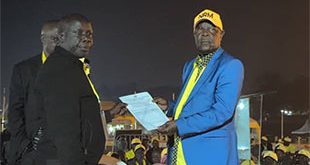
Kampala, Uganda | THE INDEPENDENT | The Environment and Natural Resources Committee of Parliament is divided on President Yoweri Museveni’s proposals regarding the Mining and Minerals Bill, 2021.
On June 18, 2022, President Yoweri Museveni returned the Mining and Minerals Bill, 2021 to parliament for reconsideration. The Bill which seeks to improve mining and mineral administration and business processes, and promote value addition to minerals was passed by Parliament on February 17 and sent to the President for assent.
But Speaker of Parliament, Anita Among on Tuesday informed Parliament that the President had returned the Bill for reconsideration.
In his letter, Museveni advised parliament to delete clause 8 on the definition of large-scale mining, because it defines large-scale mining to mean, intentional mining of minerals in mechanized operations, involving excavations of large surface pits, sinking of shafts, driving of adits or other underground openings.
He says that if the current definition is maintained, it has an effect on excluding projects like Kilembe Mines, Makutu Rare Earths Element, Rubanda, and Muko Iron Ore which are complex and capital intensive but may not meet the annual ore production exceeding 1 million tonnes.
The President asked Parliament to delete this definition and instead a new provision numbered 59 (Threshold for Large Scale Mining) be inserted under the cross heading: Large Scale Mining. This would give the Minister powers to prescribe the threshold for Large Scale Mining under the Act for different minerals.
Museveni also advised that clause 33 on the establishment of a tribunal to deal with appeals against the decision of the Minister should be substituted with an appeal being made to the High Court within 30-days of receipt of the decision. He says that the establishment of a tribunal contradicts the ongoing process of rationalization and merging of agencies.
The President states that the High Court has unlimited jurisdiction in all matters and has strengthened to improve the delivery of justice. He emphasizes that the High Court is empowered to handle grievances under the Bill.
The Speaker directed the Environment and Natural Resources Committee of Parliament to handle the named clauses expeditiously.
In its report, the committee agreed with the President’s submission justifying the deletion of clause 8 on the definition of large-scale mining, saying that this if maintained would indeed have the effect of excluding projects such as Kilembe Mines, Makutu Rare Earth Element, Rubanda, and Muko Iron Ore.
Dr. Emmanuel Otaala, the Committee Chairperson says that what may be considered as large-scale mining in terms of quantity may not be the same for another mineral in terms of quality or even in terms of capital investment.
“The Committee recommends that the definition of Large Scale Mining be deleted in clause 8. A new provision numbered 59 (Threshold for Large Scale Mining Licence) be inserted under the cross heading: Large Scale Mining Licence,” the main committee report seen by URN recommends.
The committee also pronounced itself on the provision regarding the announcement of areas for exploration, medium scale or large scale mining licenses on which President Museveni raised concern.
Dr. Otaala says that his committee considered the clause and the President’s argument and agrees with the proposed amendment because it would enable Government to use competitive bidding for the licenses it controls instead of hand picking any company. He also agrees with a suggestion by the President for any appeals to be sent to the High Court rather than a Tribunal that the Bill seeks to establish.
But a minority report by Butambala Woman MP, Aisha Kabanda dissents with the majority of the committee on one ground of excessive and open-ended delegation of ministerial powers to define and determine the classification of large-scale mining. The minority report is also signed by Bukoto East MP, Evans Ronald Kanyike .
“We agree with the President’s reasoning on the concerns over the definition of large-scale mining. We however disagree with the proposed amendment to cure the identified mischief. The power to make laws with significant ramifications on the citizens of our country is exclusively vested in the House by article 79 of the Constitution,” reads part of the minority report.
Kabanda says that delegating the authority to determine what has been considered “large-scale mining” to an office of the Minister is bad legislation. She argues that the inherent self-interest usually demonstrated by individuals holding public office is the reason some countries like Tanzania and Zambia have cured this dilemma by establishing a threshold in the Mining Act, not through Statutory Instruments.
“We propose that the House compels the committee to interact with technical officers in the Ministry responsible for mining in order to establish a schedule that will guide the different thresholds for different mineral categories for purposes of satisfying the definition and requirements of qualification of large-scale mining,” Kabanda recommends.
Parliament is yet to pronounce itself on the two reports by the Natural Resources Committee and on the returned Bill.
*****
URN
 The Independent Uganda: You get the Truth we Pay the Price
The Independent Uganda: You get the Truth we Pay the Price



